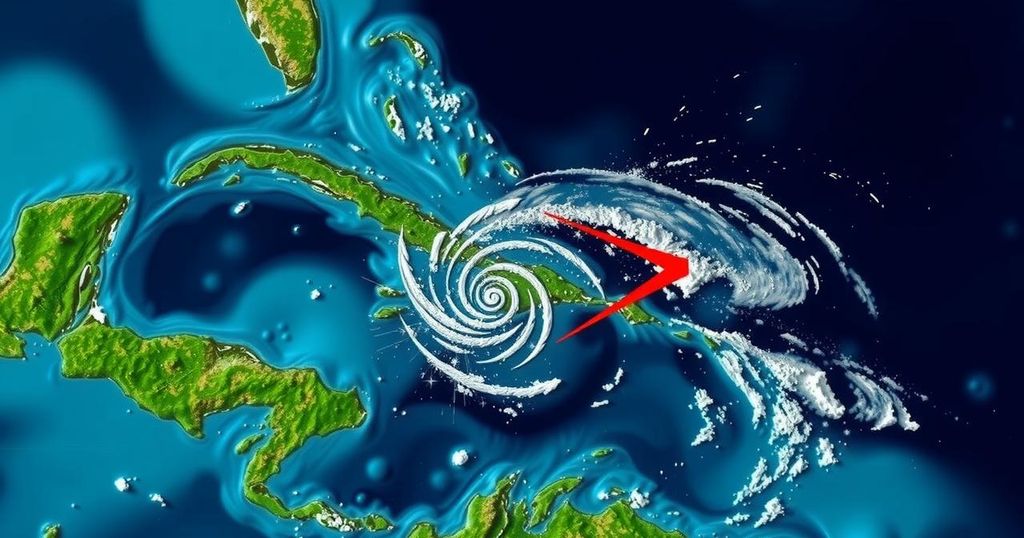Tropical Storm Oscar Approaches the Bahamas Following Devastation in Cuba

Tropical Storm Oscar is advancing toward the Bahamas after striking Cuba as a Category 1 hurricane, leading to six fatalities and significant rainfall. It is recognized as the smallest recorded hurricane, with winds primarily affecting southeastern Bahamas. Forecasters warned of continuing heavy rains, while the NOAA predicts an above-average hurricane season.
Tropical Storm Oscar is making its way toward the Bahamas after impacting Cuba as a Category 1 hurricane, resulting in at least six fatalities due to severe rainfall and flooding. This storm was positioned approximately 45 miles (75 kilometers) south-southeast of Long Island in the Bahamas, with sustained winds of 40 mph (65 kph) and a north-northeast movement speed of 12 mph (19 kph), according to the National Hurricane Center in Miami. Presently, Oscar is characterized as a minimal tropical storm, with forecasts predicting an additional 5 inches (13 centimeters) of rain in southeastern Bahamas and localized areas receiving up to 8 inches (20 centimeters). Consequently, a tropical storm warning has been activated for central and southeastern Bahamas. Oscar has distinguished itself as the smallest hurricane on record, with a wind radius of merely 6 miles (10 kilometers), surprising meteorologists as it made a landfall on Grand Inagua Island, Bahamas, and subsequently in eastern Cuba. Michael Lowry, a hurricane specialist and storm surge expert, indicated, “It is not often we see a colossal failure in hurricane forecasting,” noting that none of the predictive models had anticipated Oscar’s intensification into a hurricane. In Cuba, Oscar caused extensive rainfall, with measurements exceeding 15 inches (38 centimeters) reported in eastern regions, raising alarms about heavy flooding and potential landslides. The fatalities were recorded in Guantánamo. This disaster coincides with Cuba grappling with the aftermath of a substantial power outage, igniting small protests and prompting government officials to warn against dissent. Oscar marks the 15th named storm and the 10th hurricane of the Atlantic hurricane season that commenced on June 1 and will conclude on November 30. The National Oceanic and Atmospheric Administration (NOAA) has projected an above-average hurricane season this year, attributing this outlook to unprecedented ocean temperatures, forecasting between 17 to 25 named storms and four to seven major hurricanes of Category 3 or higher before the season’s end.
Tropical Storm Oscar formed during an active Atlantic hurricane season, which typically spans from June 1 to November 30. The NOAA has hinted at an increased likelihood of severe weather events this year, forecasting a total of 17 to 25 named storms and highlighting the impact of rising ocean temperatures on hurricane formation. The phenomenon of small hurricanes, such as Oscar, can often lead to significant damage despite their limited wind radius due to associated heavy rainfall and flooding, underscoring challenges in accurate hurricane forecasting. The political and social context in Cuba, marked by infrastructural challenges and recent unrest due to power outages, further complicates the situation following Oscar’s impact.
In summary, Tropical Storm Oscar represents an unusual event within this hurricane season, both in terms of its classification as the smallest recorded hurricane and its substantial impact on Cuba and the Bahamas. The fatalities and extensive rainfall underscore the unpredictable nature of tropical storms, regardless of size. As Oscar progresses, it serves as a reminder of the challenges faced in forecasting and managing natural disasters, especially in regions already facing difficulties such as Cuba. With the impending hurricane season still active, the focus remains on preparedness and response to mitigate future risks.
Original Source: www.usnews.com






